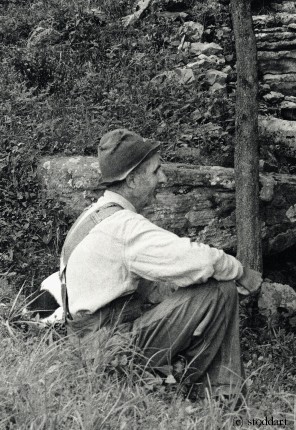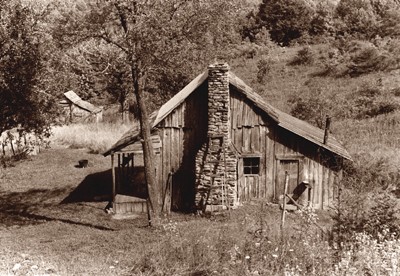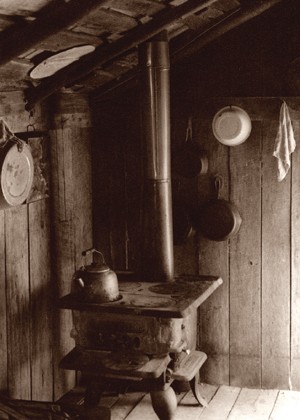| A storm was approaching from the northwest as my husband and I sat on the porch of Jack and Lynn Stoddart’s studio/guest apartment on a Wednesday afternoon. The Stoddarts live in one of the most picturesque areas of rural Overton County, and as we sat there on this particular day, we enjoyed not only the beauty of the surroundings, but we also experienced a journey by which we traveled back into a time when Jack first became acquainted with a fellow many considered a hermit living on Highland Mountain. Jack came to Tennessee from south Florida, and was staying with a friend who lived at a place called Nobody’s Mountain. His friend, Eric Bitzwand, had a couple of ponies who had wandered off from his farm, so Jack decided to go look for them. He walked for quite some distance on this particular day in March of 1971, when he happened upon someone who later became a close friend, a man whose name was Claud Ramsey. Upon seeing one another, each man was just as surprised as the other to have stumbled upon another human being in this very remote place. |
|
|
|
After hospitalities were exchanged between the two, Claud invited Jack to
walk with him back to his home which was a small two room cabin with a
barn nearby. Only the barest of necessities were inside Claude’s humble
home, a place that never had electricity or running water. Among the few
possessions in the cabin, there were two featherbeds with handmade quilts,
and in one corner of the room, stood a wood cookstove. The only item that
could be considered a modern invention Claud had was a transistor radio
that Jack says was given to Claud by Kenneth Winningham. Claud raised most
of his own food, and walked once a week some two miles over the mountain
to buy staples from Copeland’s store, a general merchandise business near
the Pleasant Valley school. That particular store building still stands
today. The distance would be much more than two miles to go by car from
Claud’s home to Copeland’s store. On the day Jack and Claud began their
friendship, Claud was dressed in overalls, was barefoot, although it was
March, and wore a felt hat. Two dogs accompanied him on his walk. Claud
extended an invitation to Jack on the occasion of their first meeting to
come and spend the night in his home anytime he needed to.
|
||
|
|
Over the next few years, Jack visited quite often with
Claud. Although it isn’t known how much of a formal education Claud had,
he was considered very much above average when it came to knowing the ways
of Mother Nature and understanding how to survive in what had to be a very
lonely world. A staff writer by the name of David Lyons from the
Nashville Banner once made a trip to interview Claud. The article he
wrote about his visit with him says that a fellow named Claude Poston, who
was described as a friend of Claud Ramsey, took the reporter to the Ramsey
home to do the interview.
|
|


